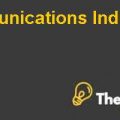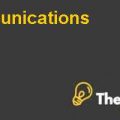Television
To: Board of BSB and Sky TV
From: Business Analyst
Date: 17 April 2018
Subject Matter: Analysis of the Case Questions
This case discussesthe rivalry between the two key competitors in the British TV industry which are the British Satellite Broadcasting Company and the Sky TV Company. Both of these companies have been attempting to become the dominant force in the face of the emerging British Satellite Television industry. This case examines the key issues of competitive positioning, scenario analysis and technology adoption. We analyze this case by answering the specific case questions as follows:
Question 1
Entrants are often hard to identify. Do you think that BSB could have been able to identify NewsCorp as a potential competitor prior Murdoch’s announcement of the launch of SkyTV?
The case states that BSB was shocked to see the announcement of the launch of Sky TV but there were different signs that existed prior to this announcement which pointed out to the possible entry of Sky TV into the satellite television industry and these signs came from News Corp. BSB should have been aware of the potential of News Corp when it was planning the launch of BSB.
One of the most important applications for exit and entry in any industry is to plan for the future but it seems that BSB did not plan for the future and it did not account for the unknown entrant, Sky TV. The company had potentially dismissed all probable entrants. For instance, when Amstrad had pulled out of the BSB consortium, a decision had been made by the management of this public company to remain within the satellite TV industry because they stated in their annual report that:
“As soon as the bureaucrats have sorted out the issues of license, timings and standards, then you would find Amstrad poised with high quality equipment and low cost.”
British Satellite Broadcasting versus Sky Television Harvard Case Solution & Analysis
The company wanted to remain within the industry even after closing out of the venture with BSB. Therefore, BSB should have kept a closer watch on Amstrad and all the other competitors so that it could respond in advance to the potential threats that developed within the marketplace. Furthermore, despite the limitations of the launch of Astra, BSB needed to evaluate it in detail and identify its ability to limit the barriers to entry by the acquisition of the broadcast rights at a significant discount.
The barriers to the entry of News Corp had been clearly limited by the reduction in the overhead costs of Astra and the D-MAC requirement that had been established by the British government within the DBS. Another reason which rationalizes the entry of News Corp is the failed bid of the company in 1986 for the British DBS franchise. It was already the owner of Sky TV and this positioned it to look for a new direction to establish its place within the British satellite industry. Murdoch also terminated the satellite TV venture, Skyband in the US and this provides us with enough clues that BSB should have been aware of the threats of Sky TV and Murdoch’s announcement...............
This is just a sample partical work. Please place the order on the website to get your own originally done case solution.












